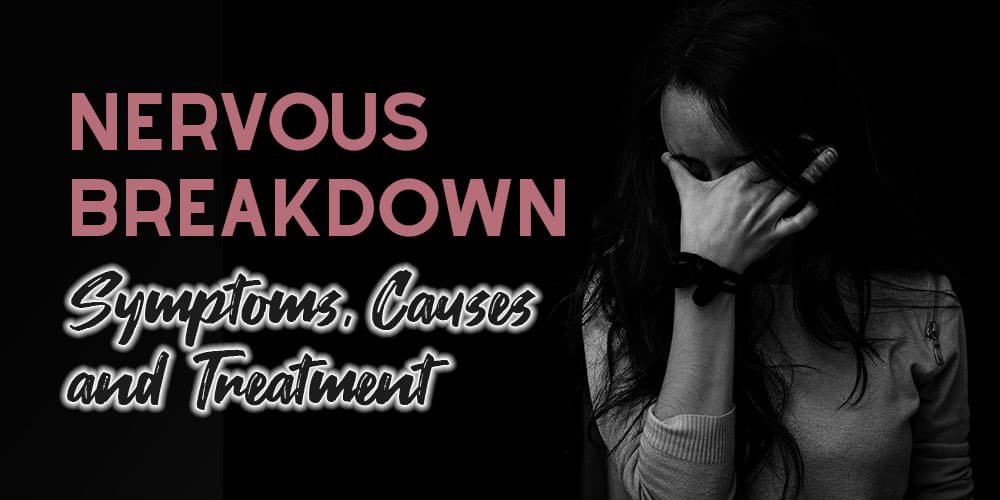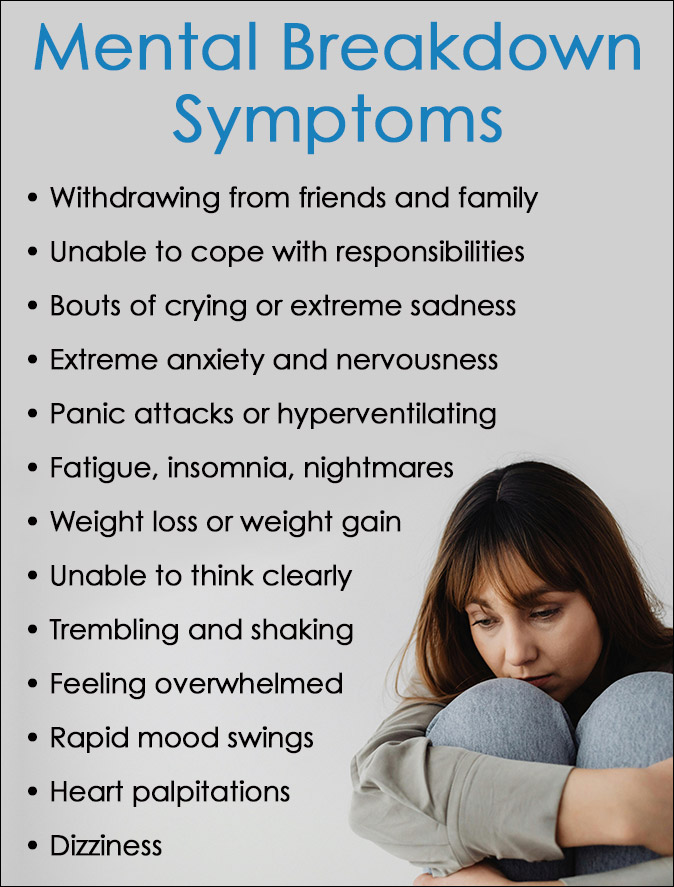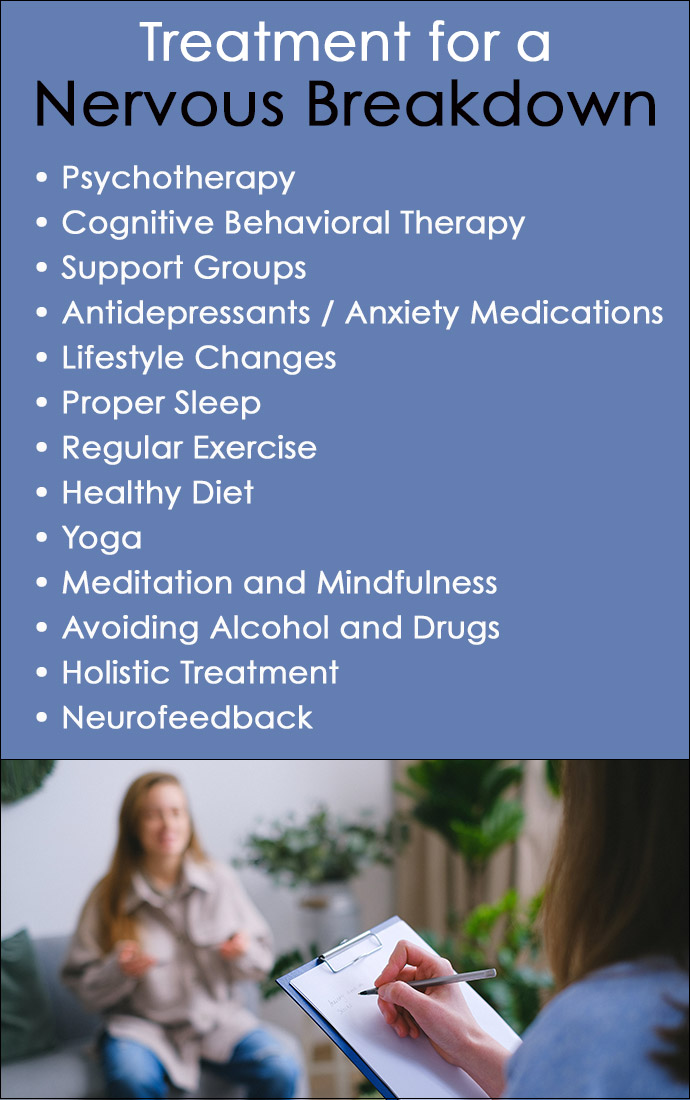
In today’s always on and hyper-connected world, it’s common for people to say they are having a nervous breakdown due to an endless amount of stress and anxiety.
Teens and young adults may be particularly prone to emotional meltdowns, but people of all ages are affected by psychological stress to the point that it impacts mental health and daily functioning.
Because emotional wellbeing can spiral out of control if not properly addressed, it’s necessary to identify the causes and symptoms of a mental breakdown before it happens and understand effective treatment methods to improve mental wellness.
What is a Nervous Breakdown?
According to Merriam-Webster, the term Nervous Breakdown is defined as an attack of mental or emotional disorder of sufficient severity to require hospitalization.
It is sometimes called a “mental breakdown” because it describes a condition of extreme mental distress characterized by the inability to function normally due to overwhelming stress, anxiety, depression, or other mental health issues.
There is no health distinction between the terms “nervous breakdown” and “mental breakdown,” and they are often used interchangeably to describe the same condition.
While a nervous breakdown is not an actual medical diagnosis, the term is still used frequently by the general public and sometimes loosely by health professionals to describe severe psychiatric symptoms that impair daily functioning.
The term nervous breakdown was originally considered a nerve disease and was also called “nervous exhaustion” or “nervous collapse.”
Later it described a person who was crumbling under the strain of too much pressure and was no longer able to function emotionally or psychologically.
At one time it was also closely linked to neurosis, and still is by some accounts due to its relationship to anxiety disorders.
Some common symptoms preceding a nervous breakdown include chronic stress, sleep disturbances, mood swings, panic attacks, and feeling unable to cope with responsibilities at work, school, or home.
An emotional or mental breakdown is the body’s natural way to force a person to stop what they’re doing and pay close attention to their mental health.
Nervous Breakdown Symptoms
The signs and symptoms of a nervous breakdown will vary from person to person based on the underlying cause.
However, there are some typical symptoms that generally apply to people experiencing this form of mental health crisis.
Common Mental Breakdown Symptoms Include:
- Extreme anxiety, nervousness, and tension
- Inability to cope with daily responsibilities
- Rapid mood swings
- Bouts of crying or extreme sadness
- Panic attacks or hyperventilating
- Unable to focus, think clearly, or make decisions
- Feeling overwhelmed by certain circumstances
- Withdrawing from friends and family
- Fatigue, insomnia, or nightmares
- Trembling, shaking, numbness, or tingling
- Heart palpitations
- Dizziness
- Weight loss or weight gain
The onset of physical, emotional, and psychological symptoms sometimes appear gradually.
At first, a person may struggle to keep up normal appearances at home or work.
However, nervous breakdown symptoms can rapidly intensify to the point of completely impairing a person’s mental functioning.
An example would be an individual who regularly calls in sick at work or is unable to get out of bed.
In severe cases, a mental breakdown may induce suicidal thoughts or psychosis accompanied by hallucinations or delusions. This can signal an emergency mental crisis that requires immediate medical care.

What Causes a Nervous Breakdown?
A wide range of emotional and psychological stressors can act as triggers before a nervous breakdown finally occurs.
Some people are more prone than others due to existing mental health issues or addiction.
Nervous Breakdown Causes Include:
- Work-Related Stress
- Family Responsibilities
- Trauma or Loss
- Health Issues
- Substance Abuse and Addiction
- Mental Illness
- Being a Perfectionist or Workaholic
Work-Related Stress
Any type of high-pressure job can create physical and mental health problems. Work overload, tight deadlines, long hours without breaks, a hostile work environment, job insecurity, and unsatisfying work all take their toll over time.
Family Responsibilities
Parenting young children and caring for sick or elderly family members can be demanding and lead to lack of sleep, financial stress, performing multiple jobs at once, and little personal time.
These emotional pressures accumulate over time and cause a person to eventually collapse.
Trauma or Loss
Post-Traumatic Stress Disorder (PTSD) frequently leads to breakdowns, especially when left untreated. Any traumatic event such as witnessing or experiencing personal violence, assault, accidents, a death in the family, and emotional abuse all act as triggers.
Even positive life events like having a baby, getting married, or starting a new career are major adjustments that create immense stress.
Health Issues
Serious health problems often go hand in hand with emotional difficulties. Chronic illness, surgery, injuries requiring rehabilitation, and disabilities all contribute intense tension and anxiety.
Hospitalization due to an accident, heart attack, cancer, and other critical health issues can trigger emotional breakdowns.
Substance Abuse and Addiction
Alcohol or drug abuse and addiction can give rise to nervous breakdowns. It’s common for many people to use substances as coping mechanisms for underlying mental health issues.
Over time, the original problems worsen, and self-medicating fails to be effective. Addiction creates severe health and cognitive consequences that lead to loss of control.
Mental Illness
People diagnosed with psychological disorders such as depression, anxiety, bipolar disorder, and schizophrenia are at an increased risk for experiencing a nervous breakdown.
Failing to manage preexisting conditions with therapy, medication, and self-care strategies can make the symptoms worse over time.
Being a Perfectionist or Workaholic
Being a perfectionist or excessive self-critic and creating unrealistic standards can set an individual up for failure.
At the same time, being a workaholic causes a lack of balance and leisure activities necessary for healthy mental functioning. Ignoring the body’s signals to rest and relax promotes emotional exhaustion and causes a mental crash.
While one main factor may induce a nervous breakdown, it’s usually an accumulation of several stressors occurring over time that influences it.
Addiction, Co-Occurring Disorders and Nervous Breakdowns
There is a strong relationship between drug and alcohol addiction, co-occurring mental health disorders, and nervous breakdowns.
Substance addiction often occurs together with mental health conditions like depression, anxiety, PTSD, and bipolar disorder. This is known as a co-occurring disorder and requires dual diagnosis rehab for recovery.
Using alcohol or drugs to self-medicate painful emotions or symptoms of mental illness may seem to help initially. Over time, substance use worsens the underlying psychological problems.
Co-occurring disorders increase the chances of relapse because mental health symptoms may reemerge without the use of alcohol or drugs as a coping mechanism.
The combination of addiction and mental illness creates a vicious cycle. Increased substance use amplifies mental health conditions that in turn, drive further drug or alcohol use.
If left untreated, co-occurring disorders dramatically raise the risk of nervous breakdowns as life becomes unmanageable.
Mental breakdowns that stem from substance addiction and mental illness tend to be more severe and dangerous. Suicidal ideations, hallucinations, and major depression requiring hospitalization are common during these events.
The connection between addiction, mental health disorders, and nervous breakdowns demonstrates why dual diagnosis treatment is so vital.
Simultaneously addressing both conditions improves recovery outcomes, whereas treating only one condition while ignoring the other rarely leads to a successful recovery from either.
DSM-5 and Nervous Breakdowns
While “nervous breakdown” itself is not a clinical term or diagnosis in the DSM-5, it generally refers to a rapid onset of psychiatric symptoms that impair daily functioning.
DSM-5 diagnoses that closely align with a mental breakdown include:
1. Major Depressive Disorder
Major Depressive Disorder is characterized by depressed mood, anhedonia symptoms, changes in weight, sleep disturbances, fatigue, feelings of guilt or worthlessness, the inability to focus or concentrate, and suicidal ideations.
2. Generalized Anxiety Disorder
Generalized Anxiety Disorder causes excessive anxiety and worry about everyday events that are out of proportion to the actual risk or danger posed. Other symptoms can include restlessness, fatigue, irritability, muscle tension, difficulty concentrating, and sleep issues.
3. Adjustment Disorders
Adjustment Disorders can be triggered by stressful situations and often lead to anxiety, depressed mood, or difficulty adjusting. The stressors can include health issues or major life transitions that demand a significant adjustment to daily living.
Even though the DSM-5 does not recognize nervous breakdown as a clinical diagnosis, it is still viewed as a mental health crisis. Incorporating or relating the symptoms to the disorders mentioned can provide a baseline for effective treatment approaches.

Treatment for a Nervous Breakdown
Recovering from a nervous breakdown requires rest combined with psychological and medical treatments that are specifically tailored to each individual.
In severe cases, hospitalization provides a safe environment for those with suicidal thoughts or psychosis to heal.
For others, inpatient or outpatient treatment programs help with recovery to transition back to a normal routine.
Nervous Breakdown Treatments include:
- Psychotherapy
- Cognitive Behavioral Therapy
- Support Groups
- Antidepressants or Anxiety Medications
- Lifestyle Changes
- Proper Sleep
- Regular Exercise
- Proper Nutrition
- Yoga
- Meditation and Mindfulness
- Avoiding Alcohol and Drugs
- Holistic Treatment
- Neurofeedback
Psychotherapy
Psychotherapy or talk therapy is an important step to identify the root causes of stress and learn coping techniques for dealing with stressful situations.
Cognitive Behavioral Therapy identifies how a person’s thoughts, beliefs, emotions, and behaviors impact each other and focuses on ways to improve negative thinking and behavior.
Support groups provide community during the healing process.
Medications
Antidepressants, anxiety medications, or antipsychotics may be beneficial to help stabilize mood, anxiety, psychosis, and sleep disturbances in the short term.
Combining medications with psychotherapy typically provides the most successful outcomes.
Lifestyle Changes
Incorporating lifestyle changes and adjusting daily habits supports mental health recovery.
Proper sleep, regular exercise, and healthy nutrition improve mood and reduce stress and anxiety that may lead to a mental breakdown.
The use of alcohol and drugs should be avoided during and after a nervous breakdown.
Holistic Wellness
Holistic wellness activities such as yoga, meditation, mindfulness, and massage are all beneficial for relaxation and focusing the mind.
Neurofeedback therapy trains an individual to gain control of negative thought patterns and identify triggers that cause mental disorders.
There is no shame in prioritizing emotional needs before they escalate into a crisis that endangers a person’s work, relationships, and overall well-being.
Recognizing the early symptoms of a mental breakdown before it happens will signify it’s time to take a break and see a mental health or medical professional.
Proper treatment is necessary for people to recover from nervous breakdown.
Related Posts
- Alcohol Dementia Causes, Symptoms and Treatment
Note: Alcohol Dementia goes by many names including, alcohol-related dementia, alcoholic dementia, and alcohol-induced dementia.…
- Histrionic Personality Disorder Symptoms, Causes, Treatment
The general public often misunderstands personality disorders. These are complex mental illnesses that might present…
- Alcoholic Neuropathy Symptoms, Causes and Treatment
Excessive alcohol consumption, especially for long-term drinkers, can create a host of difficult health issues.…
